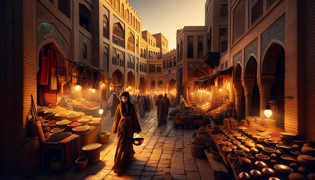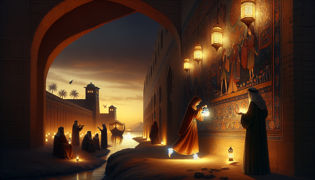The Anklet of the Desert Star
Reading Time: 11 min

About Story: The Anklet of the Desert Star is a Fairy Tale from iraq set in the Medieval. This Descriptive tale explores themes of Perseverance and is suitable for All Ages. It offers Cultural insights. In ancient Basra, a mistreated girl discovers hidden strength in a magical anklet crafted by desert spirits.
Introduction
Amina was slender as a reed in the marshes, her spirit as quiet as the twilight breeze that drifted through Basra’s winding alleyways. Each dawn found her sweeping rough stone floors under the stern gaze of her stepmother, a woman whose heart was as parched as the desert’s dunes. The air smelled faintly of rose water and dust, as though the city itself whispered secrets through worn timber doors. Sand clung to her hair like fleeting regrets, and she moved through her chores with the patience of a mourning dove.
When night fell, she escaped to the rooftop, where lantern light danced across red tiles and a distant muezzin’s voice soared like a lonely sparrow at dusk. By the beard of the Prophet, she vowed that one day her life would be like the Euphrates overflowing—rich with possibility. Beneath a canopy of stars, Amina listened to the wind hum through clay pots, each note a promise. The breeze carried the sweet tang of saffron breads baking in nearby ovens, reminding her of a home she almost forgot.
Late one eve, she discovered an ancient chest tucked behind stacked amphorae. Its lid creaked, releasing a scent of cedar wood and sandalwood, warm and melancholic. Inside lay a single silver anklet shaped like interlocking crescent moons, each etching shimmering with desert starlight. A hush fell as her fingers brushed its cool filigree; her hope glimmered like an ember buried beneath cold ashes. In that moment, the anklet pulsed softly, as though heartbeats echoed within its polished curves.
Amina clasped it around her ankle and felt a tremor of confidence. The metal was surprisingly light against her skin, yet it spoke of untold power—of hidden spirits who roamed dunes at midnight, guiding lost travellers. She held her breath, tasting warm air and the faint hiss of distant riverboats, and realised her journey had only just begun.
The Girl of Basra’s Streets
By dawn’s first blush, Amina slipped into the narrow lanes where merchants hawked dates and figs, their voices rising and falling like prayers. The stone walls radiated warmth beneath her fingertips, as rough as her stepmother’s rebukes and as relentless as the sun itself. Overhead, laundry flapped like fluttering sails, each garment whispering of distant homes. The smell of cumin and barley loaves mingled with the sticky sweetness of honey being drizzled in a busy stall. Amina’s heart was a falcon tethered too tightly, but beneath her skirts, the anklet lay hidden, an ember of promise.
She offered water and crumbs to stray cats who padded along the alleys, their fur dusty and soft as downy clouds at dawn. The market’s din was a tapestry of tongues: Persian spice traders haggling beside Berber carpet sellers, all under the ever-watchful eyes of minaret towers. Clutching a battered copper dish, she made her way back to her stepmother’s house, where a cold draft greeted her like an unwelcome guest. The walls inside smelled of vinegar and stale vinegar-stenched floors.
Her step-sisters mocked her at every turn. One sneered, “Even the camels laugh at your tattered sleeves.” The other tripped her as she passed, and Amina stumbled, the anklet’s crescent moons brushing against her skin with a secret glow. Pain cut through her like a shard of glass, but she kept her balance, determined not to shatter. She muttered in hushed tones, “By Allah’s grace, one day I’ll shine brighter than the sun in yon sky.” The words were a lifeline, a local idiom that held both defiance and hope.
That evening, exhausted and bruised, she climbed to the roof again. The air shimmered with heat and dust, with a distant echo of boat bells drifting upriver. A solitary lantern on a far balcony sputtered, rattling like a wounded bird in the warm breeze. Amina sat under the half-moon, its silver arc echoing the anklet’s design. She twisted her ankle gently and felt a soft vibration spread like golden ripples in still water. It whispered of hidden paths woven through the city’s heart, of courage waiting to awaken.
She breathed in the scent of jasmine climbing trellis walls, and for the first time, her reflection in a polished copper basin did not seem broken. The anklet hummed quietly, as though calling her forward along a path lit by stars and guarded by desert djinn. A dune of new resolve rose within her chest. She knew that tomorrow she would test its power—and perhaps, at last, change her fate forever.

The Stepmother’s Cruelty and the Anklet’s Whispers
Home was a fortress of cold marble floors and echoing halls, every corner polished until it gleamed but offered no warmth. Amina entered quietly, bowing her head as though she carried ancient secrets. Her stepmother emerged from behind a carved cedar pillar, her gold-threaded robe rustling like desert wind in an empty canyon. She hurled a plate of burnt barley cakes at Amina’s feet, the stench of scorched grain choking the air. The girl winced; the metal anklet around her ankle trembled, sending a faint chime that seemed to laugh at the injustice.
“You’re as useless as a palm tree in winter,” the woman spat, eyes cold as midnight sand. She summoned the elder sister, whose skirts swished like vipers in the sun. Together they set daunting tasks: polishing mosaic tiles until each tessera shone like a star, emptying granaries of cracked wheat, fetching water from wells a league away. The room smelled of mortar and sweat, and each task felt like scaling a barren cliff.
But when the chores pained her most, the anklet whispered through its thin silver band. It spoke in a gentle voice, full of promise and desert lore, telling her of hidden passageways and clever ruses. Amina learned to twist grains of wheat into patterns that dazzled the inspector, convincing him she had finished hours before. The anklet’s glow reflected in her eyes, beacons of determination rather than tears.
At night, she dreamt of dancing under a golden dome, her ankle clad in light. The wind carried distant drumbeats as if the sky itself beat a drum for her freedom. The texture of her dreams was soft cloth and velvet, so unlike the rough-woven sack she slept upon. She would wake at dawn with the cedar-scented chest in her thoughts, and the anklet would warm her like a mother’s embrace.
As days passed, rumours of a mysterious dancer spread through Basra’s alleys, stories whispered by lantern light and palm shadows. They spoke of a young woman whose movements were as fluid as the Tigris in flood, each step adorned by a hidden anklet that glowed like a fallen star. Even the bazaars hummed with talk of her grace and courage, fueling Amina’s resolve to embrace the magic that pulsed at her ankle’s curve. Her heart felt ready to break free, and the anklet’s song was the key.

The Festival of the Crescent Moon
The city brimmed with excitement as the Festival of the Crescent Moon neared, lanterns strung like fireflies across balconies and courtyards. Saffron-blue tents rose beside orange tents, their edges fluttering like prayer flags. The scent of grilled meats mingled with rose petals scattered on mosaic floors. Drums pulsed from distant stages, each beat echoing like a heartbeat beneath the night sky. Amina watched from the shadows, her reflection dancing in a puddle glimmering with lantern light.
She remembered her stepmother’s final decree: attend the festival, but arrive overlooked and unnoticed. The sisters would wear gowns sewn with thread of pure gold, while Amina’s dress was patched and dull. Yet the anklet’s hum grew louder, its cool metal pressing against her skin with encouragement. She found an abandoned silk robe in a chest and draped it over her patched dress. The fabric smelled of musk and old celebrations, its texture smoother than silk spun by desert spiders. She knelt and whispered to the anklet, and it pulsed, tightening into place with gentle resolve.
At the festival gates, guards in turquoise turbans demanded tokens of entry. Amina presented a simple clay coin, and they sneered. She felt her cheeks burn like desert sand under the noon sun. But then, as she slipped her foot forward, the anklet shimmered and formed a faint mist around her. The guards rubbed their eyes, and by the time they looked again, she had passed through, her presence unnoticed.
The courtyard transformed before her: acrobats tumbled on crimson rugs, and dancers swirled in gowns of emerald and ruby. Lamps in brass stands threw dancing shadows across marble pillars. Each footfall she took left a trace of silver light on the tiles, like dew catching the dawn. A hush fell as she moved toward the central dais, carrying only her quiet grace.
Amina paused where moonlight struck a gilded fountain. The water’s surface was a mirror, trembling with drops that smelled of orange blossom. She closed her eyes and let the anklet’s song guide her. When she opened them, she found herself at the edge of the dais, the crowd parting like waves. Her heart leapt; in that instant, she was no longer forgotten. She was a star that had escaped its cage, ready to illuminate the whole world.

Revelation by River Euphrates
On the last night of the festival, Amina lingered by the banks of the Euphrates, where riverboats bobbed beneath lantern-lit masts. The water rippled with reflections of palm trees and moonbeams, each wave producing a quiet susurration. The air tasted of fish and river mud, and the breeze carried hushed oud melodies from distant caravans. She pressed her palm to the anklet and felt its warmth spread like morning sun over her skin.
Behind a curtain of reeds, she discovered a gathering of city elders, their robes rustling softly. They spoke of a mysterious saviour whose footsteps had turned injustice to dust. The anklet’s light pulsed stronger, guiding her forward. Amina stepped into the circle of torchlight, her ragged sleeves concealed beneath the silk robe. The elders’ eyes widened, for the anklet’s glow revealed truths no spy could hide: cruelty wilted in its presence, and honesty blossomed like desert flowers after rain.
Her stepmother’s voice cut through the murmurs, sharp as a scorpion’s sting. The woman rushed forward, hair wild, face twisted with rage. “That anklet belongs to my daughter!” she shrieked, but the community had seen too much kindness in Amina’s deeds. One by one, witnesses recounted how she had saved children from burning granaries and guided lost travellers through blistered sands. Each testimony shimmered with sincerity, as precious as pearls harvested from the Gulf.
As dawn light tinted mud-brick walls rose-gold, the city judge lifted the anklet. He held it over Amina’s head, declaring her the true heir of its power. The anklet unfurled like a petal, releasing a soft glow that painted every face in warm hues. The stepmother’s shoulders sagged, her schemes laid bare like broken pottery shards. Amina’s cheeks flushed—not from shame, but from triumph. She slipped off the anklet and placed it in the judge’s palm, choosing humility over pride.
The elders proclaimed Amina guardian of Basra’s poorest, her heart as vast as the desert sky. The anklet found a permanent home in the city’s sacred shrine, its magic echoing through generations. A breeze stirred the water, carrying the scent of freedom and promise. In that moment, the Euphrates sang her name like a lullaby, and Amina stood tall, a desert star reborn.

Conclusion
When the shrine doors closed upon the silver anklet, Amina felt no emptiness—only a full heart and the memory of every challenge she had conquered. The courtyard where she once scrubbed floors now welcomed her as a respected guest, lanterns reflecting her calm smile. Daily, she stood by the shrine’s arches, guiding visitors and weaving stories of justice and compassion. The dry wind carried her laughter across rooftops, and children knew her face as one of warmth and strength.
Under every moon that followed, Basra remembered the girl who once wore rags but spoke with the voice of desert breezes. Merchants paused in their hawking to recount how her courage had rescued the hopeless, how a simple anklet had become a beacon of unity. Women whispered that Amina’s perseverance was like date tree roots, deep and unwavering amidst shifting sands. Men who once doubted learned to bend with compassion rather than break under pride.
Her stepmother, now humbled, sought forgiveness by tending the shrine’s lamps each dusk, the scent of incense rising like an apology. The sisters served as guides for lost pilgrims, their cruelty washed away by the same waters of the Euphrates that had lauded Amina. In every household, songs were sung of the Desert Star that outshone royal diadems.
And so, through centuries, the tale of the anklet endures in whispered poetry and market chants. It reminds all who hear it that magic often sleeps in the most overlooked places, and that perseverance can transform the smallest spark into a blazing dawn. Basra’s walls still glow at twilight, remembering Amina as the girl whose steadfast heart turned silver into legend.

















